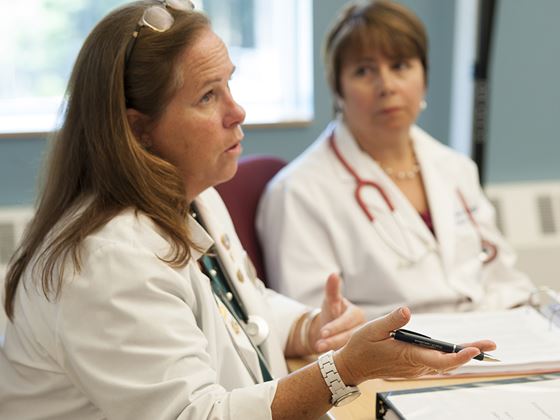Family Nurse Practitioner Certificate (Post-Master's)
-
Program Overview
Family Nurse Practitioner Post-Master’s Certificate (27 credits)
This post-master’s certificate offers advanced study with a focus on health and a holistic approach to individuals and families, offering a unique and much needed approach to Primary Care. Learn to care for patients and families across the lifespan both in health and in illness. The role of the FNP includes promoting health, preventing disease, and assessing, diagnosing and treating acute and chronic illnesses. Courses are offered in a hybrid learning model with a mix of online and evening courses to suit your lifestyle.
Upon completion of this track, you will be eligible for family nurse practitioner certification through the American Nurses Credentialing Center (ANCC) and the American Academy of Nurse Practitioners (AANP), and will be eligible to apply for state licensure.
The curriculum is aligned with the American Association of Colleges of Nursing (AACN) Master’s Essentials and the National Organization of Nurse Practitioner Faculties (NONPF) core and population competencies.
To view program application requirements, please see the Curriculum tab.

-
Curriculum
Nurse Administrator Certificate
Curriculum Requirements - Total Credits Required: 15
-
NUR 510 - Organization and Structure of Nursing Leadership (Cr: 3)
-
NUR 526 - Nurse as the Administrator (Cr: 3)
-
NUR 532 - Administration: Practice and Quality Outcomes (Cr: 3)
-
NUR 585 - Masters in Nursing Internship in Administrator Role, Educator Role and or Global Health Role (Cr: 6)
Nurse Educator Certificate
Curriculum Requirements - Total Credits Required: 15
-
NUR 505 - Curriculum Design, Course Development, and Program Evaluation (Cr: 3)
-
NUR 561 - Nurse as the Educator (Cr: 3)
-
NUR 565 - Teaching Methods: Principles of Teaching (Cr: 3)
-
NUR 585 - Masters in Nursing Internship in Administrator Role, Educator Role and or Global Health Role (Cr: 6)
Family Nurse Practitioner Certificate
Curriculum Requirements - Total Credits Required: 27
-
NUR 550 - Pathophysiology of Human Disease for Advanced Nursing Practice (Cr: 3)
-
NUR 551 - Comprehensive Health Assessment and Clinical Diagnostic Decision Making (Cr: 3)
-
NUR 562 - Advanced Pharmacotherapeutics for Family Nurse Practitioner (Cr: 3)
-
NUR 566 - Seminar for the Professional Nurse Practitioner (Cr: 2)
-
NUR 567 - Primary Care of the Childbearing Family (Cr: 3)
-
NUR 568 - Primary Care of the Childbearing Family Practicum (Cr: 5)
-
NUR 569 - Primary Care of the Adult and Geriatric Patient (Cr: 3)
-
NUR 570 - Primary Care of the Adult and Geriatric Patient Practicum (Cr: 5)
Learning Outcomes
Upon completion of the program, students will:
- Integrates scientific findings from nursing and other disciplines for the continual improvement of nursing care across diverse settings.
- Demonstrate a repertoire of skills and strategies to implement organizational and systems leadership critical to the promotion of high quality and safe patient care.
- Applies the methods, tools, performance measures, and standards related to quality, as well as quality principles within an organization.
- Apply research outcomes within the practice setting, to resolve practice problems, working as a change agent to disseminate results.
- Utilize patient-care technologies to deliver and enhance care, using communication technologies to integrate and coordinate care
- Integrates and advocates for ethical, legal and professional standards of practice and intervenes at the systems level through the policy development process.
- Communicates, collaborates, and consults with other health professionals to manage and coordinate care within the Interprofessional team
- Applies and integrates broad, organizational, client-centered, and ethnically and culturally appropriate concepts in the planning, delivery, management, and evaluation of evidence-based clinical prevention and population care including services to individuals, families, and aggregates
- Influences healthcare outcomes for individuals, populations, or systems through evidenced based nursing practice as well as the ability to integrate knowledge and formulate interventions into both direct and indirect patient care.
Reference: American Association of Colleges of Nursing (2011). The essentials of master's education in nursing. Retrieved from aacnnursing.org/portals/42/publications/mastersessentials11.pdf
View academic catalog and learning outcomes -
NUR 510 - Organization and Structure of Nursing Leadership (Cr: 3)
-
Clinical Requirements
The family nurse practitioner internship course provides students an opportunity to integrate knowledge and skills learned in the classroom setting into practice. Internship placements are arranged individually through the School of Nursing. Experiences are selected with the student to meet program requirements of 600 clinical hours.
FNP Post-Master's Certificate at a Glance
Accreditation
The Nursing Program is accredited by the Accreditation Commission for Education in Nursing, Inc. (ACEN), 3343 Peachtree Road NE, Suite 500, Atlanta, GA 30326. Phone (404) 975-5000 and Fax (404) 975-5020.